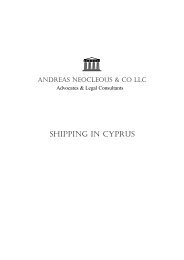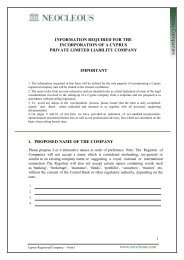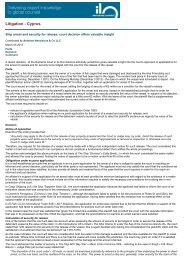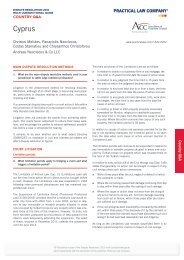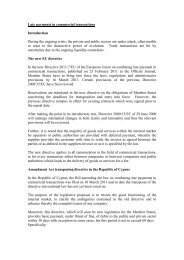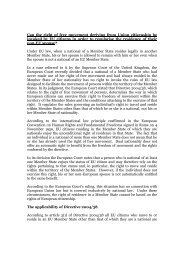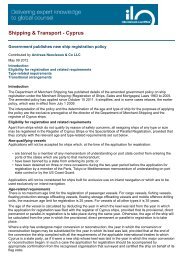DOING BUSINESS IN CYPRUS - Andreas Neocleous & Co
DOING BUSINESS IN CYPRUS - Andreas Neocleous & Co
DOING BUSINESS IN CYPRUS - Andreas Neocleous & Co
You also want an ePaper? Increase the reach of your titles
YUMPU automatically turns print PDFs into web optimized ePapers that Google loves.
Doing Business in Cyprus<br />
Because of the greater degree of separation between their management and their<br />
membership, which may number many thousands, public companies are subject to stricter<br />
governance, capital maintenance and reporting requirements than private companies.<br />
Registration formalities<br />
After approval of the company's name, a Memorandum and Articles of Association must be<br />
submitted to the Registrar of <strong>Co</strong>mpanies, with details of the share capital, directors,<br />
secretary and registered office. A certificate of incorporation is usually issued within a<br />
month, unless expedited.<br />
Share capital<br />
There is no minimum share capital for a private company. For a public company the<br />
minimum is €25,630. There is a capital duty of €103 plus 0.6% of the authorised share<br />
capital.<br />
Capital duty<br />
On incorporation of a Cyprus registered company, capital duty of €103 plus 0.6% of the<br />
authorised capital is payable to the Registrar of <strong>Co</strong>mpanies. Any subsequent increase in<br />
authorised share capital is liable to capital duty at 0.6%. No capital duty is payable on share<br />
premium and capital duty can be minimised by issuing a reduced nominal value of shares at<br />
a premium.<br />
Directors' liability<br />
A director's duties are owed to the company. <strong>Co</strong>mmon law duties include fiduciary<br />
duties (to exercise powers for the benefit of the company, retain freedom of action and<br />
avoid conflicts of interest) and a duty of skill and care, not to act negligently in managing<br />
the company's affairs. There are also statutory duties, some imposing criminal penalties,<br />
and duties owed to creditors.<br />
Reporting requirements<br />
<strong>Co</strong>mpany directors are responsible for maintaining appropriate books and records to<br />
present a true and fair view of the company's affairs, to explain its transactions and to<br />
allow the preparation of financial statements. The directors must present a full set of<br />
financial statements to the annual general meeting of the company; if a company has<br />
subsidiaries, consolidated financial statements are required. Under the <strong>Co</strong>mpanies Law all<br />
limited liability companies must have their financial statements audited by an authorised<br />
independent auditor unless they satisfy at least two of the following criteria:<br />
total assets, before deducting liabilities, do not exceed €3,417,200;<br />
annual turnover does not exceed €6,834,400; and<br />
average number of employees for the year does not exceed 50.<br />
Notwithstanding this "small companies" exemption under the <strong>Co</strong>mpanies Law, the Income<br />
Tax Law requires all companies to submit an annual tax return based on financial statements<br />
audited by authorised auditors. This effectively means that all companies are required to<br />
prepare audited financial statements.<br />
16




